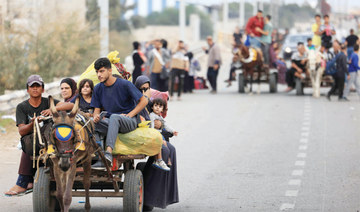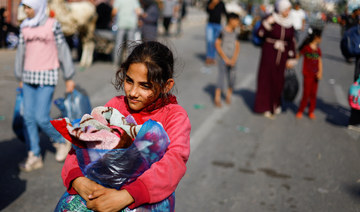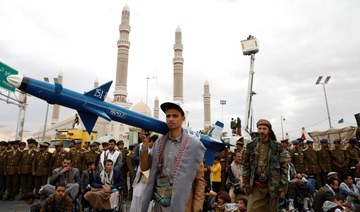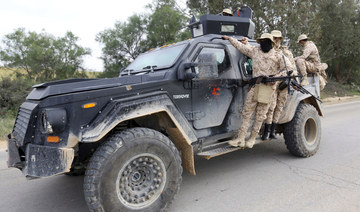RAFAH, Palestinian Territories: When Khulud Jarboueh and her children fled their home in the northern Gaza Strip under Israeli bombardment in early October, the young ones were wearing just shorts and T-shirts.
The heat of late summer still lingered then. But now she rummages through piles of clothing looking for something to keep them warm in the rain and bitter cold.
“We left Gaza City with 20 members of the family more than a month ago,” the 29-year-old told AFP at a second-hand clothes stall outside a school in Rafah run by the UN agency for Palestinian refugees (UNRWA).
They had left the north of the Palestinian territory after Israel warned people to flee south, saying it was safer there.
The exodus came after Israel’s military began a relentless bombardment of Gaza after Hamas militants stormed across the border on October 7 and killed around 1,200 people, mostly civilians.
They also seized around 240 hostages in attacks that sparked massive retaliation from Israel. The Hamas government in Gaza says Israeli attacks have killed around 11,500 people, including thousands of children.
Now Jarboueh and her family sleep on the floor of the UNRWA school.
“We didn’t take any clothes with us. But now it’s cold and I have to buy winter stuff,” she said at the stall where items of clothing go for a shekel each (around $0.25).
Even before the war, life in the Gaza Strip was difficult.
The United Nations estimates that in 2022, the blockade Israel had enforced against the territory since 2007 had “hollowed out Gaza’s economy.”
“The restrictions on movement also impede access to health and other essential services, as 80 percent of Gazans depend on international aid,” said UNCTAD, the UN Conference on Trade and Development.
Unemployment in the densely populated strip of land squeezed between Israel, Egypt and the Mediterranean Sea was 45 percent.
Today, the UN says, all 2.4 million people in Gaza are going hungry, and 1.65 million have been displaced by the war. With almost half the houses in Gaza destroyed or damaged, poverty will only get worse.
“It’s the first time in my life I’ve had to buy second-hand clothes,” said Jarboueh. “We’re not rich, but I can usually afford to pay 10 shekels for an item of clothing for the children.
“Now they’re coughing because it’s so cold. I have no other choice.”
She said she was sure the old clothes were “full of germs.”
“But they’re going to have to put them straight on. I don’t have the water to shower my children, let alone do the laundry.”
On a road lined with stalls, hundreds of Palestinians held up items to check sizes or compare fabrics. The temperature has now dropped and downpours are common.
Farmer Walid Sbeh said he has been uprooted from his land, and does not have a shekel to his name. He camps at the UNRWA school each night with his wife and 13 children.
“I can’t stand it, seeing my children still in their summer clothes go hungry, and I know I can’t buy them anything,” he told AFP.
“This is no life. They force us from our homes and kill us in cold blood. If we don’t die in the bombing we die of hunger or thirst, sickness and cold,” he said.
Sbeh said that when they left after their house was bombed they brought blankets with them.
“But on the road, the Israeli soldiers told us to drop everything and keep our hands up.”
He said some people gave them warmer clothing their own children had outgrown.
Adel Harzallah, who runs a clothes shop, said his stock of winter pyjamas sold out in two days.
“The war began when we were waiting for winter wear to arrive. It was due to come across the border” but that shut after the October 7 attacks in Israel.
Now his goods were stuck in containers, like food, drinking water and fuel, all only to be released for a high price.
One potential customer left Harzallah’s store disappointed.
“Seventy shekels for a jacket? I can’t pay that — I’ve got five kids,” she said.
Abdelnasser Abu Dia, 27, told AFP he “doesn’t have enough to buy bread, let alone clothes.”
For a month he had only the clothes in which he fled.
But as the temperature dropped, “someone gave me and my kids sportswear jackets. We’ve been wearing them non-stop for a week.”
Displaced Gazans search for warm clothes as cold draws in
https://arab.news/jjxp7
Displaced Gazans search for warm clothes as cold draws in
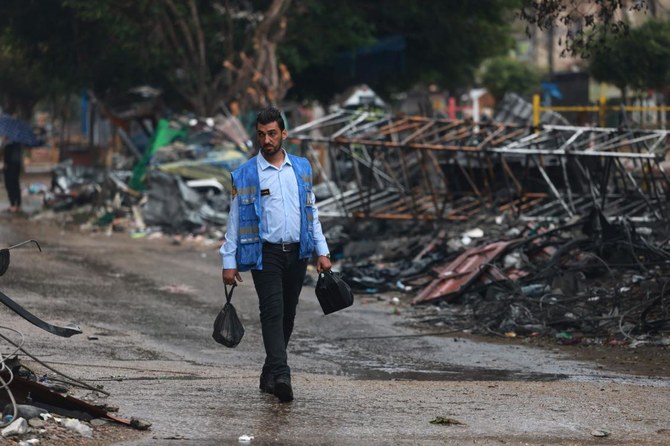
- The exodus came after Israel’s military began a relentless bombardment of Gaza
- Even before the war, life in the Gaza Strip was difficult
US calls on Iran to halt ‘unprecedented’ weapons transfers to Yemen’s Houthis for attacks on ships

- The Houthis have launched more than 50 attacks on shipping, seized one vessel and sunk another since November, the US Maritime Administration said late last month
UNITED NATIONS: The United States called on Iran on Monday to halt its transfer of an “unprecedented” amount of weaponry to Yemen’s Houthi rebels, enabling its fighters to carry out “reckless attacks” on ships in the Red Sea and elsewhere.
US deputy ambassador Robert Wood told the UN Security Council that if it wants to make progress toward ending the civil war in Yemen it must act collectively to “call Iran out for its destabilizing role and insist that it cannot hide behind the Houthis.”
He said there is extensive evidence that Iran is providing advanced weapons, including ballistic and cruise missiles, to the Houthis in violation of UN sanctions.
“To underscore the council’s concern regarding the ongoing violations of the arms embargo, we must do more to strengthen enforcement and deter sanctions violators,” Wood said.
The Houthis say their attacks on shipping in the Red Sea and Gulf of Aden are aimed at pressuring Israel to end its war with Hamas in Gaza, which has killed more than 35,000 Palestinians there. The war began after Hamas-led militants attacked Israel on Oct. 7, killing 1,200 people and taking some 250 others hostage.
The Houthis have launched more than 50 attacks on shipping, seized one vessel and sunk another since November, the US Maritime Administration said late last month.
Houthi attacks have dropped in recent weeks as the rebels have been targeted by a US-led airstrike campaign in Yemen. Shipping through the Red Sea and Gulf of Aden has declined because of the threat.
But Hans Grundberg, the UN special envoy for Yemen, warned the council that “hostilities continue” even though there has been a reduction in attacks on commercial and military vessels in the Red Sea, Gulf of Aden and the Indian Ocean as well as a reduction in the number of US and British airstrikes on targets in Yemen.
He pointed to an announcement by the Houthis that they will “expand the scope of attacks,” calling this “a worrisome provocation in an already volatile situation.”
Russian Ambassador Vassily Nebenzia told the council that the Israeli announcement on May 6 that it was starting its military operation in Gaza’s southern city of Rafah, where 1.2 million Palestinians had sought safety, ratcheted up the spiral of escalation in the region “another notch further.”
“There’s no doubt that this will have an impact on the situation in Yemen’s surrounding waters,” he said, noting the Houthis’ opposition to Israeli attacks that harm Palestinian civilians.
But, Nebenzia added, “We call for a swift cessation of the shelling of commercial vessels and any other actions that hamper maritime navigation.”
He sharply criticized the United States and its Western allies, saying their “totally unjustified aggressive strikes” in Yemen violate the UN Charter. He said they further complicate an already complex situation and won’t improve the situation in the Red Sea.
The war between the Houthis and pro-government forces in Yemen backed by a coalition of Gulf Arab states has raged since 2014. The Houthis swept down from the mountains, seized much of northern Yemen and the country’s capital, Sanaa, and forced the internationally recognized government to flee into exile to Saudi Arabia. Since then, more than 150,000 people have been killed by the violence and 3 million have been displaced.
Fighting has decreased markedly in Yemen since a truce in April 2022, but there are still hotspots in the country
Grundberg recalled that in December the Houthis and the government “took a courageous step toward a peaceful solution” by agreeing to a series of commitments that would provide for a nationwide ceasefire, ensure desperately needed humanitarian aid, and initiate a political process to end the conflict.
But UN humanitarian chief Martin Griffiths reported “alarmingly high” levels of severe food deprivation across the country that are expected to worsen during the lean season for crops starting in June.
Griffiths also expressed serious concern about a rapidly worsening cholera outbreak. He cited reports of 40,000 suspected cholera cases and over 160 deaths — “a sharp increase” since last month, the majority in Houthi-controlled areas “where hundreds of new cases are reported every day.”
Tunisian police storm lawyers’ headquarters and arrest another lawyer

- Dozens of lawyers including Zagrouba gathered earlier on Monday in front of the courtroom, chanting slogans including: “What a shame, the lawyers and the judiciary are under siege”
TUNIS: Tunisian police stormed the bar association’s headquarters for the second time in two days and arrested a lawyer, witnesses said on Monday, after detaining two journalists as well as another lawyer critical of the president over the weekend.
A live broadcast on media website TUNMEDIA showed videos of broken glass doors and toppled chairs while the police arrested the lawyer Mahdi Zagrouba and other lawyers screamed in the background. Zagrouba is a prominent lawyer known for his opposition to President Kais Saied.
On Saturday, police stormed the building of the Tunisian Order of Lawyers and arrested Sonia Dahmani, a lawyer also known for her fierce criticism of Saied.
Dahmani had said on a television program last week that Tunisia was a country where life was not pleasant. She was commenting on a speech by Saied, who said there was a conspiracy to push thousands of undocumented migrants from Sub-Saharan countries to stay in Tunisia.
Some opposition parties described the storming of the lawyers’ building on the weekend as “a shock and major escalation,” and the bar association declared a nationwide strike.
Dozens of lawyers including Zagrouba gathered earlier on Monday in front of the courtroom, chanting slogans including: “What a shame, the lawyers and the judiciary are under siege.”
The Interior Ministry said in a statement that “the judicial decision against Zagrouba was due to his physical and verbal assault on two policemen today near the courtroom.”
Tunisia’s public prosecutor on Monday extended the detention of two journalists, Mourad Zghidi and Borhen Bsaiss, who were also on arrested on Saturday over radio comments and social media posts in a separate incident.
“It’s a horror scene... police entered in a showy manner and arrested Zagrouba and dragged him to the ground before some of them returned to smash the door glass,” said lawyer Kalthoum Kanou who was at the scene.
Saied took office following free elections in 2019, but two years later seized additional powers when he shut down the elected parliament and moved to rule by decree.
He also assumed authority over the judiciary, a step that the opposition called a coup.
Top Biden official doubts Israel can achieve ‘total victory’ in Gaza

- Israel has killed more than 35,000 Palestinians, according to Gaza’s Health Ministry
WASHINGTON: The Biden administration does not see it likely or possible that Israel will achieve “total victory” in defeating Hamas in the Palestinian enclave of Gaza, US Deputy Secretary of State Kurt Campbell said on Monday.
While US officials have urged Israel to help devise a clear plan for the governance post-war Gaza, Campbell’s comments are the clearest to date from a top US official effectively admitting that Israel’s current military strategy won’t bring the result that it is aiming for.
“In some respects, we are struggling over what the theory of victory is,” Campbell said at a NATO Youth Summit in Miami. “Sometimes when we listen closely to Israeli leaders, they talk about mostly the idea of....a sweeping victory on the battlefield, total victory,” he said.
“I don’t think we believe that that is likely or possible and that this looks a lot like situations that we found ourselves in after 9/11, where, after civilian populations had been moved and lots of violence that...the insurrections continue.”
Israeli Prime Minister Benjamin Netanyahu has repeatedly vowed to achieve “total victory” against Hamas, the Palestinian militant group that attacked Israel on Oct. 7 and killed 1,200 people and took 250 others hostage.
In response, Israel unleashed a relentless assault on the Gaza Strip, killing more than 35,000 people, according to the figures of the Gazan health ministry, and reducing the densely populated tiny enclave to a wasteland.
Campbell’s comments come as Washington is warning Israel not to go ahead with a major military offensive in Rafah, the southernmost city of the Gaza Strip where over a million people who have already been displaced by Israeli attacks are taking shelter.
Likening the situation in Gaza to that of a recurring insurgency that the United States faced in Afghanistan and Iraq after its invasions there following the Sept. 11 attacks, Campbell said a political solution was required.
“I think we view that there has to be more of a political solution...What’s different from the past in that sense, many countries want to move toward a political solution in which the rights of Palestinians are more respected,” he said.
“I don’t think it’s ever been more difficult than right now,” he added.
UN says Gaza death toll still over 35,000 but not all bodies identified

- Haq said those figures were for identified bodies — 7,797 children, 4,959 women, 1,924 elderly, and 10,006 men — adding: “The Ministry of Health says that the documentation process of fully identifying details of the casualties is ongoing”
UNITED NATIONS/GENEVA: The death toll in the Gaza Strip from the Israel-Hamas war is still more than 35,000, but the enclave’s Ministry of Health has updated its breakdown of the fatalities, the United Nations said on Monday after Israel questioned a sudden change in numbers.
UN spokesperson Farhan Haq said the ministry’s figures — cited regularly by the UN its reporting on the seven-month-long conflict — now reflected a breakdown of the 24,686 deaths of “people who have been fully identified.”
“There’s about another 10,000 plus bodies who still have to be fully identified, and so then the details of those — which of those are children, which of those are women — that will be re-established once the full identification process is complete,” Haq told reporters in New York.
Israel last week questioned why the figures for the deaths of women and children has suddenly halved.
Haq said those figures were for identified bodies — 7,797 children, 4,959 women, 1,924 elderly, and 10,006 men — adding: “The Ministry of Health says that the documentation process of fully identifying details of the casualties is ongoing.”
Oren Marmorstein, spokesperson for Israel’s Ministry of Foreign Affairs, on Monday accused Palestinian militants Hamas of manipulating the numbers, saying: “They are not accurate and they do not reflect the reality on the ground.”
“The parroting of Hamas’ propaganda messages without the use of any verification process has proven time and again to be methodologically flawed and unprofessional,” he said in a social media post.
Haq said UN teams in Gaza were not able to independently verify the Gaza Ministry of Health (MoH) figures given the ongoing war and sheer number of fatalities.
“Unfortunately we have the sad experience of coordinating with the Ministry of Health on casualty figures every few years for large mass casualty incidents in Gaza, and in past times their figures have proven to be generally accurate,” Haq said.
The World Health Organization “has a long-standing cooperation with the MoH in Gaza and we can attest that MoH has good capacity in data collection/analysis and its previous reporting has been considered credible,” said WHO spokesperson Margaret Harris.
“Real numbers could be even higher,” she said.
Libya customs officers arrested over huge gold shipment

- The country is split between Abdelhamid Dbeibah’s UN-recognized government in Tripoli and a rival administration in the east, backed by strongman Khalifa Haftar
TRIPOLI: Libyan authorities have arrested several customs officials for attempting to traffic abroad about 26 tons of gold worth almost 1.8 billion euros ($1.9 billion), prosecutors said.
The Libyan prosecutor’s office did not detail the suspected origin of the massive amount of precious metal, greater than the national gold reserves of many countries.
Authorities in Misrata, western Libya, made the arrests related to the trafficking operation at the port city’s international airport, the office said Sunday night.
“The investigating authorities ordered the arrest of the director general of customs and customs officials at the international airport of Misrata,” it said in a statement released on Facebook.
The officials had attempted in December 2023 to traffic the gold bars weighing some 25,875 kilograms, currently worth almost 1.8 billion euros, the statement said.
Libyan law says only the central bank can export gold, said the office, which opened an investigation into the case in January.
Libya has been plagued by political instability and violence since the 2011 overthrow and killing of longtime dictator Muammar Qaddafi.
The country is split between Abdelhamid Dbeibah’s UN-recognized government in Tripoli and a rival administration in the east, backed by strongman Khalifa Haftar.
Misrata, east of the capital Tripoli, played a key role in fighting Qaddafi’s forces, as well as against the Daesh group’s fighters in 2016, and in battling against a failed offensive by Haftar’s forces against the capital Tripoli in 2019.
The US-based non-government group The Sentry, which investigates trafficking in conflict areas, said that chaos-torn Libya has become a key hub for illicit gold trafficking over the past decade.
“Particularly since 2014, Libya has been used as a transit area toward places such as the UAE and, to a lesser extent, Turkiye” for trafficking gold, according to report the group published last November.
“Two crucial points of transit are used to export gold on an illicit basis: the port and airports of the Misrata-Zliten-Khums area and those of Benghazi” in the east, the report said.







